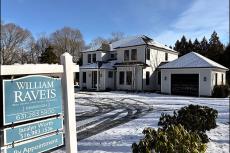When Donald Horowitz heard about a cherry tomato that was purple through and through, he was instantly intrigued. “I’m always looking for something that is either new or different to present to the customer,” said the co-owner of Wittendale’s, a florist and garden center that squeezes a remarkable array of plants onto just over an acre on East Hampton’s Newtown Lane.
A horticulturalist with a deep interest in experimentation and innovation and a penchant for old-style pick-up-the-phone networking, he discovered the Purple Tomato (it’s a trademark) on a Zoom program promoted to fellow Cornell University alumni earlier this year.
“It’s brand new; it’s not around, and while there are purple or dark-colored tomatoes, most of them it’s in the skin of the tomato but the inside is still the typical tomato red. . . . This one was touted as being purple inside, outside, completely, completely purple.”
Bioengineered in England, the Purple Tomato has largely been marketed to home gardeners only in seed form and only in the United States through Norfolk Healthy Produce. Mr. Horowitz wanted Wittendale’s to become one of the few retailers in the country and the only one on Long Island licensed to sell Purple Tomato seedlings, so after that Zoom program, he called the presenter, Nathan Pumplin, and said, “I’d like to add that to my collection.”
Much the way “a used book dealer collects certain things or curates certain things . . . I’m almost doing the same with certain plants,” he said. If someone asks for it and Wittendale’s doesn’t have it, he will work to track it down from one of the 15 or so primarily Long Island-based plant wholesalers he buys from, many of which he has decades-long relationships with. And when he sees something new or rare or unusual that wows him, he will find a way to bring it to Wittendale’s or grow it onsite.
Where the Purple Tomato is concerned, Wittendale’s bought a few hundred seeds from which to grow its own seedlings, and by the end of May they were ready for sale alongside more familiar tomato varieties like Sun Gold and beefsteak. The tomatoes’ deep color is due to the presence of snapdragon genes, and the antioxidant-rich fruit is touted as having a longer shelf life than an heirloom variety.
But because the Purple Tomato is genetically modified, it can only be sold in the U.S. While Mr. Horowitz knows that many consumers are leery of bioengineered products, the horticultural crowd that joined that Zoom call over the winter was not. “I guess the bioengineering concept is to come up with better traits in a plant,” he said. “And then I learned, which I didn’t know, that almost all the corn that is out there is bioengineered.”
The Purple Tomato is one of several passion projects for Mr. Horowitz, whose enthusiasm for horticulture is infectious. On a recent tour of the garden center, he pointed also to a new native plant section featuring perennials best suited to Long Island’s specific growing conditions, much harder to source than the average consumer might think. And while he does not shy away from a product like the bioengineered tomato, Wittendale’s also has a huge inventory of organic herb and vegetable seedlings.
Succulents are another of his specialties, and he and his staff grow a lot of them on the premises. “That’s something I like doing. I don’t want to say quite a hobby because this is a business, but if I go somewhere and I see a different variety, I’ll buy one and I may pay retail and I’ll use it and I’ll propagate from it.”
Many wholesalers won’t grow dahlias because they are fragile when they get to a marketable size and “they can’t ship enough on a cart to make it profitable,” so Wittendale’s grows its own dinnerplate dahlias. Similarly, Mr. Horowitz has found that commercial growers tend to avoid the common geranium because of the area required to grow them well. With some creative use of space, Wittendale’s can give the humble geranium the room it needs to become its best self. “People always tell me we have the best geraniums,” and that’s why.
Success for the business, which Mr. Horowitz co-owns with Robert Dale, depends on this kind of ingenuity and on knowing what the customer wants and when they want it. A garden retailer farther west on Long Island might be clearing out the yard by late June, but Mr. Horowitz and Mr. Dale know that here, some of their regular second-home gardeners are just gearing up for the season. The outdoor display areas are still overflowing with herb and vegetable seedlings, annuals and perennials, and outdoor houseplants, and new ones are arriving every week.
“I can sort of keep a pulse on my wholesalers,” knowing who has which a crop ready and when to keep the yard filled with diverse offerings. “It’s like a chessboard, like a puzzle. . . . It’s really nice when you’re able to have a rapport with your grower. . . . It’s that personal connection that makes a difference.”
Wittendale’s has the distinction of being one of a very small handful of retailers in the village that “can sell to everybody,” Mr. Horowitz said. “I’m really trying to be very fair with the pricing. Somebody who can barely scrape together $15 can get a bouquet, and the next minute the florist is doing a $500 arrangement.”
A small organic Sun Gold seedling will set you back just about $7, while the premium Purple Tomato seedling costs $14.99 for a small pot. And lest you think it’s too late to start your tomato garden, fear not: “This year we had such cold weather and the soil, of course, was colder. There was no true gain with trying to beat the system and go early because the plants just sat there.”



